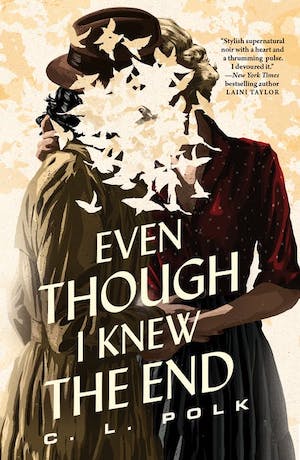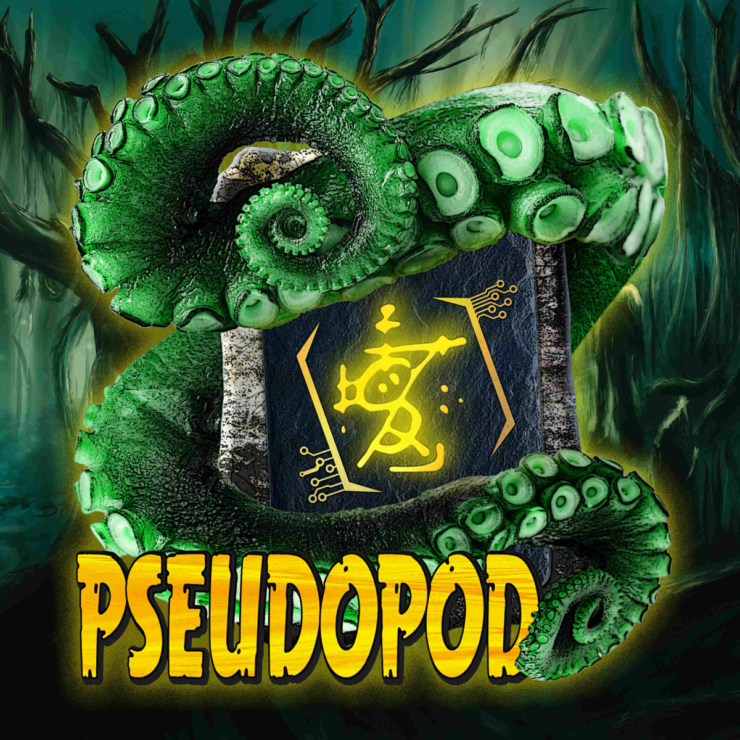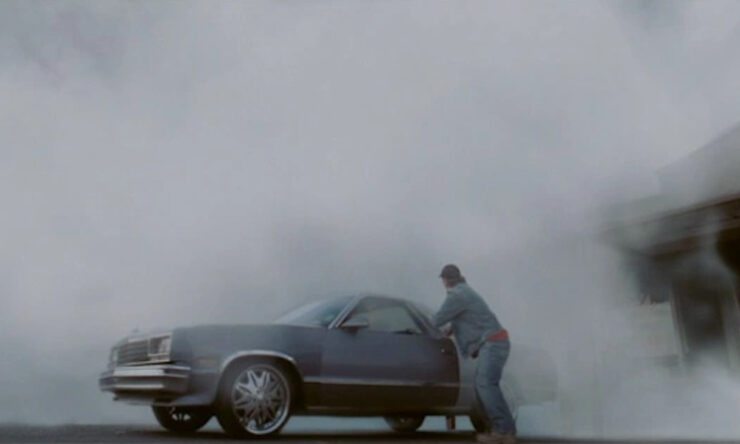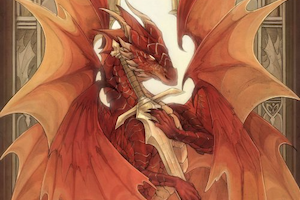Welcome back to Reading the Weird, in which we get girl cooties all over weird fiction, cosmic horror, and Lovecraftiana—from its historical roots through its most recent branches.
This week, we cover Vivian Shaw’s “Black Matter,” first published in July 2019 in Pseudopod. Spoilers ahead!
“People have described it as sweet. To me it’s a salty kind of stink, black-green and grinning, ready to surge out of hidden hollows with the roar of a million flies.”
The National Transportation Safety Board relies on science and technology to explain plane crashes: black box recorders and quick-access recorders; radar tracking and transponder data; weather records; all the tell-tales of the material and chemical worlds with regards to explosions or sabotage. Usually these tools do the trick. When they fail, what’s the NTSB’s last resort?
Magic. Specifically, the Board’s “contingency communications specialist,” freelance necromancer Devin Stacy. Sometimes only the dead know the answers, so who are you going to call if not someone who can speak to them?
Devin prefers substantial remains to “conjure” with, say, a stray finger picked up on site or the “pink soup” of pulverized flesh and bone soaking what’s left of a cockpit. He starts his current NTSB job with a case full of tubed samples, from which he can capture only a garbled “cacophony of terror and pain.”
He needs to get boots on the ground.
The Board flies him to a West Virginia site “halfway along one of the old earth-wrinkle mountains, between a couple of nothing towns,” the nearest of which goes by the not-at-all-ominous sobriquet of Mount Storm. His chartered Cessna makes a rough landing due to a sudden crosswind; the pilot thinks the winds from the mountain have really gotten worse lately. A helicopter will take Devin the last miles to the crash. Already, impossibly, he imagines he can smell the characteristic stink of aviation carnage, that amalgam of “meat and chemicals,” soil and fire and decay.
Chief Investigator Wayne Dooley greets Devin with his typical witticisms about “Mr. Wizard” and “magic wands.” Devin shrugs off the sarcasm. He learns that none of the flight recorders survived in usable form, that the 757 had passed its last maintenance check, and that there were no witnesses to the crash. So it’s time for him to “do his thing.”
The NTSB team backs off. Devin negotiates still-smoldering wreckage and the “high-pitched yammering” of the traumatized dead until he locates the former cockpit by “its deeper weight on reality.” What he’s about to do is to “create a certain very specific and controlled metaphysical atmospheric situation.” He starts by drawing a circle around himself with a chalk made of dead men’s bones. Once it’s closed, he’s safe from outside observation and interference. He takes out a crystal pendulum and a folding knife with which he cuts an already scar-laddered left forefinger. Then all that’s necessary is the saying of certain words, the touch of his bleeding finger to the chalk circle, and the quartz crystal grows almost too hot to hold.
A figure rises from the circle-center as if breaking the surface of a lake. The stripes on his uniform identify him as the doomed flight’s pilot—good thing, as Devin can’t ID him from file photos, seeing his face has become “a churned mass of meat with holes in it.” The pilot is screaming, a sound that batters not Devin’s ears but his mind, inescapable. It continues until the dead man registers Devin’s presence, takes in his NTSB windbreaker and collection of amulets. Devin can then address him by name—Captain Warner—and ask what went wrong with the plane.
Buy the Book


Even Though I Knew the End
Sometimes the dead can give a simple answer. This isn’t one of those times. Warner must take Devin’s hand in his shattered one and so draw the necromancer into his memory. Transported into the 757 cockpit, five and a half miles above the Appalachian mountains, Devin stands between Warner and his copilot. Through the forward windows he sees what Warner sees: the classic anvil of a thunderhead ten miles wide and centered above the tallest summit of the mountain-ridge ahead. The storm is directly in their flight path, yet—it doesn’t appear on the weather radar display. At all, period, while all other instruments are functioning properly. Warner stares at the impossible cloud, entranced. By the time the copilot notices the thunderhead, its turbulence surrounds them. Warner’s desperate course correction comes too late. The 757 plunges into the storm that radar continues to indicate isn’t there and thrashes in its grip until monster lightning spears the cabin and fries all controls.
Devin opens his eyes to Warner’s ruined face. The pilot gives his hand a squeeze and vanishes, leaving Devin back at the crash site, breathing its complex stench and “the distinctive burned-tin stink of magic.” He scuffs away his chalk-circle and reappears to Dooley and his team.
The best explanation he can give them for the crash is “Weather.” All-systems destructive lightning, fire, immediate loss of control. His recommendation is that the FAA issue warnings about this area, rerouting all flights away from a region where such dangerous conditions are likely to reoccur. Dooley reluctantly buys this answer as better than none.
The NTSB doesn’t like “Act of God” conclusions, but Devin can’t tell them the last thing he saw in Warner’s memory. He looked down at the mountaintop far below, and “something vast had looked back at me and seen me.”
What, in that mountain, wants to create instrumentation-opaque storms to engulf aircraft and cast their occupants to terrible deaths? Devin thinks it must be “older than people, old as the wrinkled rock of the mountain itself, something that has perhaps slept for a very long time—but is awake now, and hungry.”
He can’t stop thinking about how it looked up at him.
“How it had smiled.”
What’s Cyclopean: Devin translates from bureaucratese: “contingency” (as in contingency communications specialist) means “probably fatal.”
Weirdbuilding: The closest town to the crash site is Mount Storm, a name Devin finds “too fucking Lovecraft for words”.
Libronomicon: The opening quote from Henry V is from an ordinary soldier, discussing how if they are dying in a bad cause, “the king himself hath a heavy reckoning to make”. For what ill-omened authority does Captain Warner die?
Madness Takes Its Toll: Most people who try necromancy “do the mindblock thing” and keep safely on the side of comfortable self-delusion.
Anne’s Commentary
In her notes to the Pseudopod podcast of “Black Matter,” Vivian Shaw confesses that she’s an “aviation nerd with trainwreck syndrome,” and her amateur expertise shows in the story. I love pretty much any fiction that’s grown out of the writer’s passionate interests, their obsessions (in a positive, a creative, sense of the word.) It’s the difference between the seedling of a story idea planted in already rich deep soil and one planted in sand left sterile or only hastily amended with research-compost. The proof is in the vigorous flowering and fruiting of the former “seedling,” as compared to the spindliness or even failure of the latter.
The plot that knowledgeable gardener Shaw grows for her readers is a dark beauty. Very dark, and smelling more like the titan arum or corpse flower than a rose, but sometimes you’re in the mood for the combined aromas of garlic, sweat, feces and rotting meat, right? At a fictional distance, anyhow.
Shaw also explains that she writes “fiction in which the supernatural and ordinary exist side-by-side—monsters and magic are real, if not commonly understood.” That could serve as a decent definition of urban fantasy, or of most fantasy actually. Without “ordinary” nature, there can be nothing supernatural. In a fictional milieu where everyone understands magic, magic ceases to be magical—it’s everyday tech then. I’m reminded of Cast a Deadly Spell, which upfront declares that in 1948 Los Angeles, everybody uses magic, or can use it if they want to; only private dick Harry Lovecraft abstains, for reasons. That situation leads to a farcical overabundance of monsters and sorcery, great and petty. Which is fine for the farce that Cast a Deadly Spell is, but which doesn’t make for the genuine shock and awe that dark fantasy delivers.
“Black Matter” goes for that shock and awe first by rich realistic detail of a shocking situation, the 757 crash. It then ups the awe by limiting its magic to one practitioner, necromancer Devin Stacy. In “Black Matter’s” milieu, magicians are rare enough for “normals” to practice self-defensive derision in their presence and to jump at a magical reappearance they’ve likely witnessed before from their “contingency communications specialist.” Devin reflects that the core of necromancy, creating and controlling a “metaphysical atmospheric situation” in which the quick and dead can communicate, isn’t “really hard.” Kids can summon a “wavery ghost” in the parental garage, but (BIG but), most don’t have the psychological gumption to maintain the contact. They’re scared off from the occult for life. It’s the psychically adept (or aberrant) who get over the initial shock and go on to practice magic.
They’re the ones you have to keep an eye on, presumably to make sure they remain “tame” sorcerers rather than criminal ones. Devin’s a “tame” necromancer. He implies that such beasts are rare by wishing the NTSB had another “tame” ghost-whisperer on call.
The temptation to use necromancy for foul purposes would be great. Remember Joseph Curwen and his friends? They called up the dead to enrich themselves and gain greater magical power, not to assist governmental agencies when “normal” agents had slammed into investigatory dead-ends. This is one of Devin’s jobs. That he’s a “freelance” necromancer makes me wonder what other types of jobs he takes on.
To enable Captain Warner to tell the tale all the State’s functionaries couldn’t suss out is an act of compassion as well as information-procurement. No wonder it’s his ghost who immediately takes advantage of the metaphysical space Devin creates. As pilot of the doomed 757, he must be dying in death to explain what happened, to justify his actions to the extent they deserved. All this is assuming that the dead cannot lie. Because if they can, or if Devin can’t tell when they do, necromancy loses much of its utility.
Warner also has a dire warning to pass on: The mountain above the town of Mount Storm, I figure Mount Storm itself, houses a monster. The worst kind of monster, too, one that’s hungry and that somehow slakes its hunger on human death. One that must amuse itself by killing, because it smiles. It smiles!
What is the monster? Devin can only speculate, though probably with a psychic acuteness that perceives more than “normals” could. I can only speculate that the mountain-thing (mountain-intelligence?) is the “black matter” of the title. Is this “black matter” the same as that “dark matter” which theoretically accounts for most of the universe’s matter while remaining detectable mainly through otherwise inexplicable gravitational effects otherwise? Or did the vast mountain-thing appear black to Devin, translate to his metaphysically-atmospherically enhanced vision as black? And as smiling.
It’s this emotional apprehension of the entity that haunts Devin, as well it might. There’s nothing scarier than a monster that grins at its own deeds of malice, mocking anyone alive enough to observe it. Hence the horror of clowns?
Could be. Clowns are the most obviously gleeful of villains, but a smiling mountain-something, yeah, that could be even worse.
Ruthanna’s Commentary
My primary exposure to Vivian Shaw’s work is the Greta Helsing series. It’s cozy urban fantasy about a doctor serving the supernatural community, great for a chilly night when it feels like people aren’t taking good enough care of each other. On one level, Devin Stacy is filling the same sort of niche. Sure, chats with the decaying dead may not be as pleasant as lecturing suave vampires about their iron levels—but it’s still someone using niche expertise to do practical jobs that badly need doing, and to make the world just a little better taken-care-of.
And really, how creepy do you expect a story to be, when it starts out by earworming you with “Stacy’s Mom”?
But Devin’s necromancy is not the fun kind. It’s the kind that involves interrogating the traumatized dead, looking and feeling about as you would expect from the output of a hard-to-investigate plane crash. And it’s the kind that involves seeing the horrors that led to that output—because Devin’s necromancy is also not the scariest supernatural thing going on.
It does seem to be the scariest supernatural thing that the National Transportation Safety Board has heard of, which raises the question of how they heard about it at all. It’s not exactly the natural home for Mulder and Scully. Is there a clearinghouse for connecting various sorts of psychics with agencies that can use their talents? Telepaths to study neurology at NIH, and clairvoyants to improve NOAA’s weather forecasting? (And yes, I would totally read the story about the clearinghouse dispatchers.) Or did Devin just show up on their doorstep one day and convince them that he could do what he claimed?
And why can Devin do this? He says himself that anyone could, that he’s one of the few who came back for more after the initial scare, correlating the contents of his memory despite the risk. But he doesn’t exactly seem to enjoy the work. Something must have drawn him to keep experimenting. Was his first experience maybe a little more practical than most? If he solved some mystery the first time, if the scare was in service of laying questions to rest, he might feel like it was all worth the scars.
In general, he seems to see more value in resolving mysteries than in opening them up. Confronted with an ancient horror well above his pay grade, he provides his employers with a tidy partial truth and keeps it to himself. Maybe he just doesn’t trust Dooley to handle it sensibly. Or maybe he sees his job as providing comfortable closure, even if it’s based in illusion. Very Lovecraftian, that.
So for now, we’re just going to tell planes to avoid the area with the weird weather—apparently everyone’s going to believe Devin’s explanation that this area’s become prone to anomalous thunderstorms, despite the fact that he’s not NOAA’s pet clairvoyant. For some reason, I’m not convinced that the ancient, hungry force beneath the crash site is going to grumble and go back to bed.
I am, in fact, worried that it’s going to find new ways to get the things that make it smile. And that won’t provide comfortable closure, illusory or otherwise, for anyone.
Next week, we continue N. K. Jemisin’s The City We Became with Chapter 14: The Gauntlet of Second Avenue. Now that we know the Enemy is everywhere, we do… what?
Ruthanna Emrys’s A Half-Built Garden is now out! She is also the author of the Innsmouth Legacy series, including Winter Tide and Deep Roots. You can find some of her fiction, weird and otherwise, on Tor.com, most recently “The Word of Flesh and Soul.” Ruthanna is online on Twitter and Patreon, and offline in a mysterious manor house with her large, chaotic, multi-species household outside Washington DC.
Anne M. Pillsworth’s short story “The Madonna of the Abattoir” appears on Tor.com. Her young adult Mythos novel, Summoned, is available from Tor Teen along with sequel Fathomless. She lives in Edgewood, a Victorian trolley car suburb of Providence, Rhode Island, uncomfortably near Joseph Curwen’s underground laboratory.














